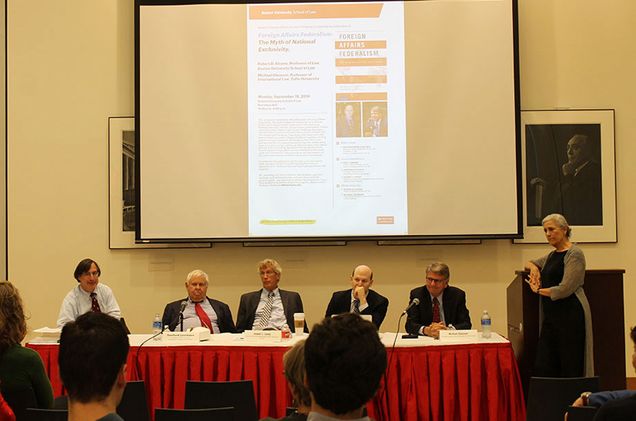Foreign Affairs Federalism, by Professors Robert Sloane and Michael Glennon
Scholars examined the tensions laid bare between state and federal governments conducting foreign policy in this new book, published by Oxford University Press.
On September 19, students, faculty, and scholars gathered in Boston University School of Law’s Barrister’s Hall to celebrate the publication of Foreign Affairs Federalism: The Myth of National Exclusivity (Oxford University Press), co-authored by BU Law’s R. Gordon Butler Scholar in International Law and Professor of Law Robert Sloane, and Michael Glennon, professor of international law at the Fletcher School of Law and Diplomacy at Tufts University and former William and Patricia Kleh Visiting Professor in International Law at BU Law.
Foreign Affairs Federalism challenges the assertion that the federal government has complete control over US foreign policymaking, arguing that cities and states have become increasingly active in the realm of foreign policy. Sloane and Glennon cite examples of cities limiting greenhouse gas emissions, declaring nuclear free zones, and establishing sister-city relationships to illustrate their argument.
The book was published in May 2016, so the symposium was both a celebration and an opportunity for analysis and discussion of its topics. After introductions from BU Law Dean Maureen A. O’Rourke and Professor of Law and Law Alumni Scholar Pnina Lahav, attention was turned to a panel of speakers, comprised of the authors and Gary Lawson, BU Law’s Philip S. Beck Professor of Law, Sanford Levinson, W. St. John Garwood and W. St. John Garwood Jr. Centennial Chair and Professor of Government at University of Texas Law School, and Hon. Robert J. Cordy, retired associate justice of the Massachusetts Supreme Judicial Court. Each discussed their thoughts on the work and raised questions about the book’s arguments.

Professor Lawson addressed what he saw as one of the three main missions of the book. The main goal, he explained, was to “lay out exactly what state and local governments do in the area of foreign affairs,” describing in painstaking detail the judicial and nonjudicial doctrine that is developed around it. This descriptive mission, Lawson asserted, is the wildly successful “main thrust” of the book. He also discussed immigration, noting that the lack of an immigration clause in the Constitution reveals immigration’s true nature as a state issue, not a federal one. This, he claimed, is a strong point in favor of Sloane and Glennon’s argument that state and local policy impacts foreign affairs.
Sanford Levinson spoke next, focusing on both the “ambivalence” present throughout the book and the Constitution’s role in foreign affairs. “This whole field is rife with functionalist adjustment and making pragmatic decisions that are never going to satisfy some people,” he said. But there also exists the fact that many people see the Constitution as a system of rules, and that we “look to state and local courts to figure out what the rules are.” Foreign Affairs Federalism, he said, incorporates and brings light to that tension.
Robert Cordy illustrated his agreement with much of the book’s content by offering his experiences serving on the Massachusetts Supreme Judicial Court. He explained how Russians and Turks had approached the Court seeking help understanding federalism to implement into judicial systems back in their countries. These examples revealed how localized US systems could influence foreign affairs.
Michael Glennon and Robert Sloane closed the event. Both provided insight into the origin of the book’s thesis, and how it developed. Sloane took the opportunity to respond to thoughts from other panelists on the different themes throughout the book.